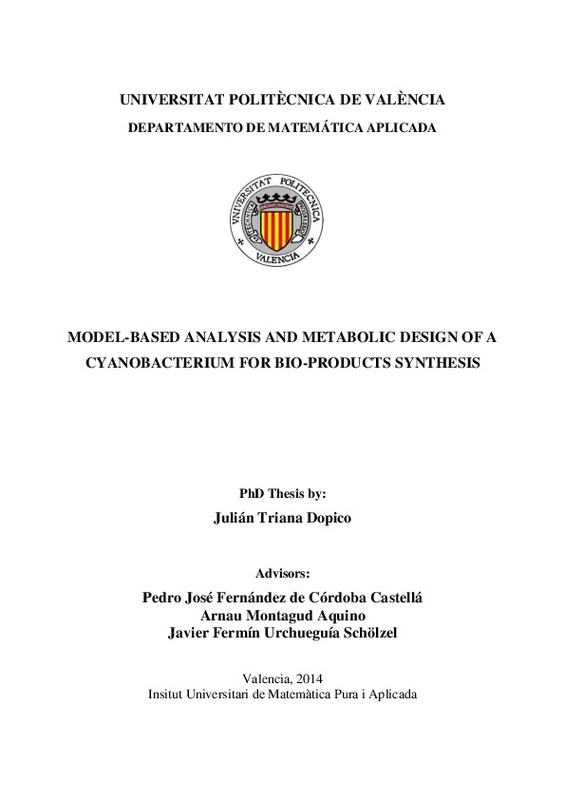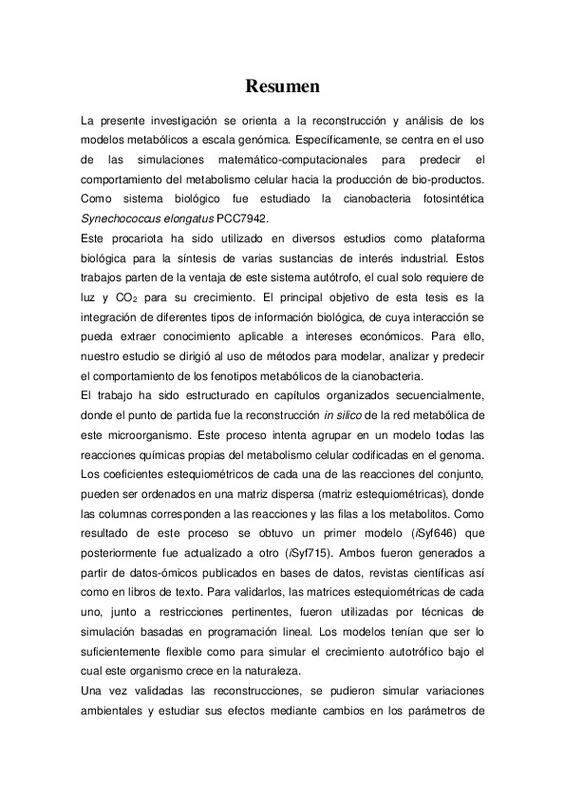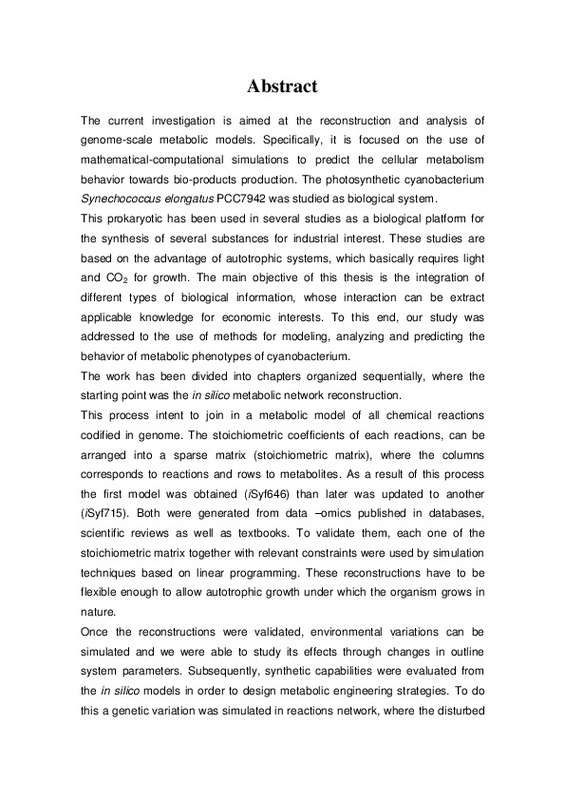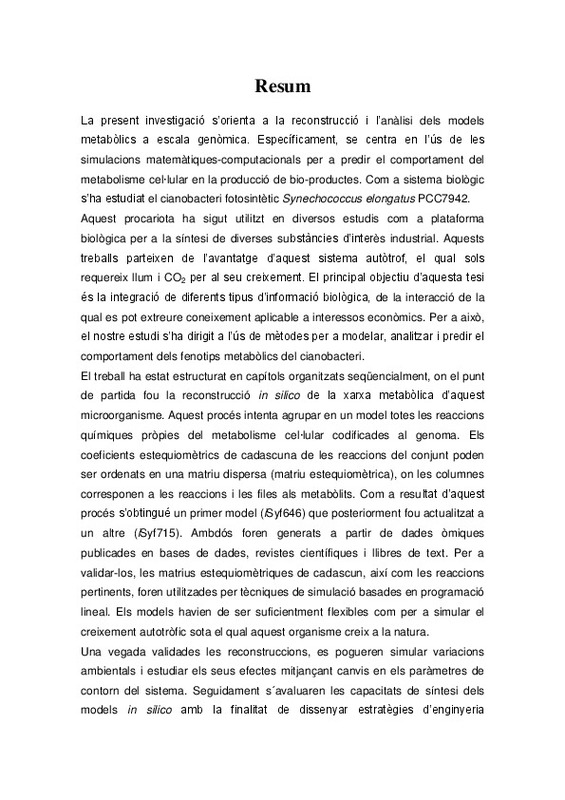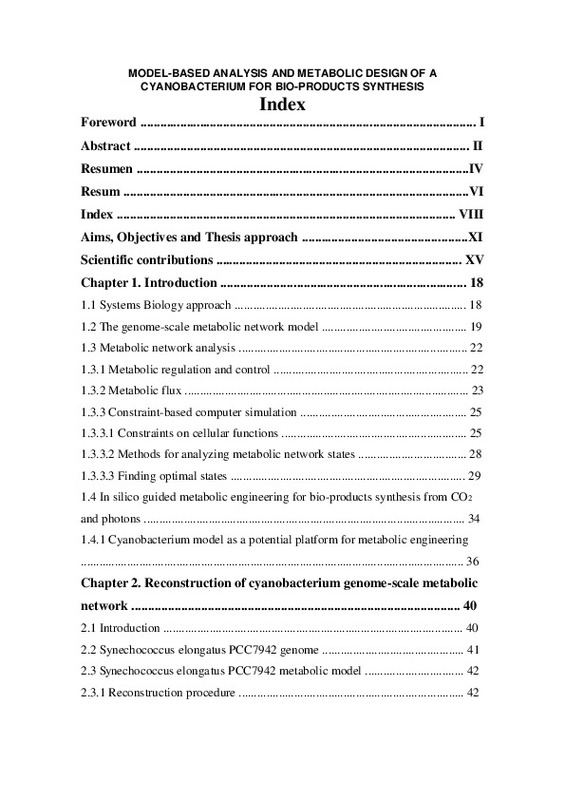- RiuNet repositorio UPV
- :
- Investigación
- :
- Tesis doctorales
- :
- Ver ítem
JavaScript is disabled for your browser. Some features of this site may not work without it.
Buscar en RiuNet
Listar
Mi cuenta
Estadísticas
Ayuda RiuNet
Admin. UPV
Model-based analysis and metabolic design of a cyanobacterium for bio-products synthesis
Mostrar el registro sencillo del ítem
Ficheros en el ítem
| dc.contributor.advisor | Fernández de Córdoba Castellá, Pedro José
|
es_ES |
| dc.contributor.advisor | Montagud Aquino, Arnau
|
es_ES |
| dc.contributor.advisor | Urchueguía Schölzel, Javier Fermín
|
es_ES |
| dc.contributor.author | Triana Dopico, Julián
|
es_ES |
| dc.date.accessioned | 2014-09-03T06:59:27Z | |
| dc.date.available | 2014-09-03T06:59:27Z | |
| dc.date.created | 2014-07-24T08:00:08Z | es_ES |
| dc.date.issued | 2014-09-03T06:59:24Z | es_ES |
| dc.identifier.uri | http://hdl.handle.net/10251/39351 | |
| dc.description.abstract | The current investigation is aimed at the reconstruction and analysis of genome-scale metabolic models. Specifically, it is focused on the use of mathematical-computational simulations to predict the cellular metabolism behavior towards bio-products production. The photosynthetic cyanobacterium Synechococcus elongatus PCC7942 was studied as biological system. This prokaryotic has been used in several studies as a biological platform for the synthesis of several substances for industrial interest. These studies are based on the advantage of autotrophic systems, which basically requires light and CO2 for growth. The main objective of this thesis is the integration of different types of biological information, whose interaction can be extract applicable knowledge for economic interests. To this end, our study was addressed to the use of methods for modeling, analyzing and predicting the behavior of metabolic phenotypes of cyanobacterium. The work has been divided into chapters organized sequentially, where the starting point was the in silico metabolic reconstruction network. This process intent to join in a metabolic model of all chemical reactions codified in genome. The stoichiometric coefficients of each reactions, can be arranged into a sparse matrix (stoichiometric matrix), where the columns corresponds to reactions and rows to metabolites. As a result of this process the first model was obtained (iSyf646) than later was updated to another (iSyf714). Both were generated from data ¿omics published in databases, scientific reviews as well as textbooks. To validate them, each one of the stoichiometric matrix together with relevant constraints were used by simulation techniques based on linear programming. These reconstructions have to be flexible enough to allow autotrophic growth under which the organism grows in nature. Once the reconstructions were validated, environmental variations can be simulated and we were able to study its effects through changes in outline system parameters. Subsequently, synthetic capabilities were evaluated from the in silico models in order to design metabolic engineering strategies. To do this a genetic variation was simulated in reactions network, where the disturbed stoichiometric matrix was the object of the quadratic optimization methods. As a results sets of optimal solutions were generated to enhanced production of various metabolites of energetic interest such as: ethanol, n-butanol isomers, lipids and hydrogen, as well as lactic acid as the compound which is an interest to the industry. Furthermore, functionally coupled reactions have been studied and have been weighted to the importance in the production of metabolites. Finally, genome-scale metabolic models allow us to establish criteria to integrate different types of data to help of find important points of regulation that may be subject to genetic modification. These regulatory centers have been investigated under drastic changes of illumination and have been inferred operational principles of cyanobacterium metabolism. In general, this thesis presents the metabolic capabilities of photosynthetic cyanobacterium Synechococcus elongatus PCC7942 to produce substances of interest, being a potential biological platform for clean and sustainable production. | es_ES |
| dc.language | Inglés | es_ES |
| dc.publisher | Universitat Politècnica de València | es_ES |
| dc.rights | Reserva de todos los derechos | es_ES |
| dc.source | Riunet | es_ES |
| dc.subject | Systems biology | es_ES |
| dc.subject | Genome-scale metabolic network reconstruction | es_ES |
| dc.subject | Constraints-based analysis | es_ES |
| dc.subject | Metabolic engineering strategies | es_ES |
| dc.subject | Value-added metabolites production | es_ES |
| dc.subject | Synechococcus elongatus PCC7942 | es_ES |
| dc.subject.classification | MATEMATICA APLICADA | es_ES |
| dc.subject.classification | FISICA APLICADA | es_ES |
| dc.title | Model-based analysis and metabolic design of a cyanobacterium for bio-products synthesis | |
| dc.type | Tesis doctoral | es_ES |
| dc.identifier.doi | 10.4995/Thesis/10251/39351 | es_ES |
| dc.rights.accessRights | Abierto | es_ES |
| dc.contributor.affiliation | Universitat Politècnica de València. Departamento de Matemática Aplicada - Departament de Matemàtica Aplicada | es_ES |
| dc.description.bibliographicCitation | Triana Dopico, J. (2014). Model-based analysis and metabolic design of a cyanobacterium for bio-products synthesis [Tesis doctoral]. Universitat Politècnica de València. https://doi.org/10.4995/Thesis/10251/39351 | es_ES |
| dc.description.accrualMethod | TESIS | es_ES |
| dc.type.version | info:eu-repo/semantics/acceptedVersion | es_ES |
| dc.relation.tesis | 9461 | es_ES |
Este ítem aparece en la(s) siguiente(s) colección(ones)
-
Tesis doctorales [5389]






